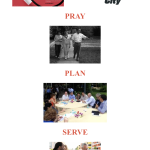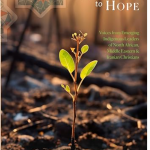 For nearly 15 years, our organization’s new missionary orientation has featured a workshop entitled, “Missions is High Adventure,” which pretty much seeks to establish a connection between cross-cultural service and whitewater rafting or an Outward Bound rock-climbing vacation. Seriously, we’ve said for some time that this job is hard work. If we’re going to be successful, we have to embrace it — nearly like a runner embraces a marathon or a mud-laden survival course. After all, people pay good money to hang on the edge of a cliff, with one rope and a couple of toe-holds being the only thing separating them from a 300-foot drop. Our cause, on the other hand, is a bit more eternal — and worth it. So — this is what we do. We believe strongly in member care and have now sought to infuse it throughout every single member of the organization. But at the same time, we also believe that the best way to stay healthy is to pursue our Great Passion of “creative, strategic perseverance until the results are achieved.” Here are a couple of ways one can observe our resilience at work:
For nearly 15 years, our organization’s new missionary orientation has featured a workshop entitled, “Missions is High Adventure,” which pretty much seeks to establish a connection between cross-cultural service and whitewater rafting or an Outward Bound rock-climbing vacation. Seriously, we’ve said for some time that this job is hard work. If we’re going to be successful, we have to embrace it — nearly like a runner embraces a marathon or a mud-laden survival course. After all, people pay good money to hang on the edge of a cliff, with one rope and a couple of toe-holds being the only thing separating them from a 300-foot drop. Our cause, on the other hand, is a bit more eternal — and worth it. So — this is what we do. We believe strongly in member care and have now sought to infuse it throughout every single member of the organization. But at the same time, we also believe that the best way to stay healthy is to pursue our Great Passion of “creative, strategic perseverance until the results are achieved.” Here are a couple of ways one can observe our resilience at work:
*** If a critical incident happens on our team, the Protocol Guidebook calls for us to debrief it in the region rather than back in the USA. Research, along with our experience, has shown that our workers recover much more quickly and effectively when we follow this protocol closely.
*** In the case of kidnappings, we never pay ransom. Ever. We’re now in our 34th year and, by God’s grace, we have yet to experience a kidnapping. Let’s hope we never do. But if we do, whether it’s an “express kidnapping” (in which perpetrators ask for relatively smaller amounts of ransom payment and try to resolve the kidnapping quickly) or otherwise, for our strategy to continue to be effective, our workers, and their families, need to be of one mind and of one commitment to hold the line on ransom. Because the day we start paying it, our workers the world over will become a bigger target. For as long as we hold out, we lessen our risk. During my watch as president, I’m committed to holding out.
*** New to our protocols (as of the past year) — if a worker is expelled, he or she will now be asked to debrief and redeploy to another site in the region without breaking stride by returning to the USA. This mentality requires mental preparation in advance so please help us get the word out — we’re transitioning our thinking to a stance that assumes that, over time, there is now a much stronger likelihood that we might have to redeploy more often. Let’s be ready for it.
What are the matching protocols used by your own organization or family? Do these seem difficult or harsh? How do your practices differ and why? To respond, just click “Comment,” below. We appreciate your feedback!
Doug












Our organization recently added a policy related to the compassionate handling of widows and widowers. Basically we commit to providing a year of ongoing support to enable the widow or widower to transition back and begin to get through the grieving process. (I’ve heard of horror stories where agencies and/or churches dropped the support of a surviving spouse within weeks or even days.)
Thanx for sharing wisdom in protocols which is essential to good member care. We need more sharing of these member care gems. Hey, any chance I could look at your Protocol Handbook to see if we might have missed something?
I’m in the process of rethinking and rewriting some of our company’s member care framework. I would love to see your Protocol handbook to use as a reference tool as well.
thanks